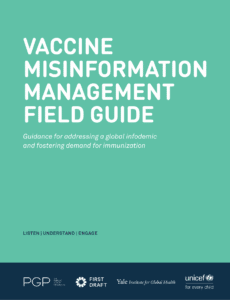Misinformation Alerts
Knowing what misinformation is being shared can help you generate effective messaging.
These insights are based on a combination of automated media monitoring and manual review by public health data analysts. Media data are publicly available data from many sources, such as social media, broadcast television, newspapers and magazines, news websites, online video, blogs, and more. Analysts from the Public Good Projects triangulate this data along with other data from fact checking organizations and investigative sources to provide an accurate, but not exhaustive, list of currently circulating misinformation.
Misinformation Alerts
Knowing what misinformation is being shared can help you generate effective messaging.
These insights are based on a combination of automated media monitoring and manual review by public health data analysts. Media data are publicly available data from many sources, such as social media, broadcast television, newspapers and magazines, news websites, online video, blogs, and more. Analysts from the Public Good Projects triangulate this data along with other data from fact checking organizations and investigative sources to provide an accurate, but not exhaustive, list of currently circulating misinformation.Alerts are categorized as high, medium, and low risk.
- High risk alerts: Narratives with widespread circulation across communities, high engagement, exponential velocity, and a high potential to impact health decisions. Are often more memorable than accurate information.
- Medium risk alerts: Narratives that are circulating in priority populations and pose some threat to health. Potential for further spread due to the tactics used or because of predicted velocity. Often highlights the questions and concerns of people.
- Low risk alerts: Narratives that are limited in reach, don’t impact your community, or lack the qualities necessary for future spread. May indicate information gaps, confusion, or concerns.
Several posts baselessly claim that Japan is banning mRNA COVID-19 vaccines and blood donations from vaccinated people.
Recommendation: Both claims are false. Publically funded COVID-19 vaccinations ended on March 31, but vaccinations will continue for a fee. The claims about a blood donation ban are based on a non-peer-reviewed literature review that cites several well-known anti-vaccine advocates and has no impact on Japan’s immunization policies. Fact-checking sources: AFP, AAP Fact Check 
A preprint of an FDA study investigated the risk of febrile seizures following mRNA COVID-19 vaccination in children ages 2 to 5. The study found a slight increase in risk the day after the Moderna vaccination compared to the control period of eight to 63 days after vaccination. Vaccine opponents are circulating the study as proof that the vaccines are not safe for young children.
Recommendation: Prebunking talking points may emphasize that numerous studies, including the FDA study in question, have found COVID-19 vaccines to be safe for young children with an extremely low risk of serious side effects. Additionally, COVID-19 infection has been shown to significantly increase febrile seizure risk in children. Messaging may explain that the FDA study didn’t compare risk in unvaccinated and vaccinated children. It compared seizure risk only in the period immediately after and several weeks after vaccination. Messaging may also emphasize that the study found the overall risk of febrile seizures to be quite low—not unlike other vaccines—and concluded that “the safety profile of the monovalent mRNA vaccines remains favorable for use in young children.” Fact-Checking Source(s): Vaxopedia, News Medical
A recent study investigating adverse reactions to COVID-19 vaccines is being misrepresented online. One popular post, which does not link to or even name the study, highlights that the researchers found that people with prior COVID-19 infections were more likely to have adverse reactions after COVID-19 vaccination. The post falsely claims that vaccination after infection is “all risk, no benefit.”
Recommendation: Messaging may highlight that the study found that serious adverse reactions were very rare and that increased risk was for mild, self-reported side effects like injection site reaction, headache, and fever. These side effects are normal and expected after vaccination, and most were resolved within 36 hours. Messaging may also reiterate that this study confirmed that the risks of COVID-19 vaccination in people with prior infection are low, especially compared to the benefits. An analysis of 26 studies found that hybrid immunity was far more effective against infection and severe illness than immunity from infection alone. Fact Checking Source(s): GAVI, CIDRAP
A popular conspiracy theorist aired a segment falsely claiming that COVID-19 vaccines contain toxic DNA and cancer viruses. The video also repeats the disproven claim that cancer rates are “exploding” due to COVID-19 vaccines.
Recommendation: The large audience of the conspiracy theorist increases the risk of his claims. Debunking messaging may emphasize the overwhelming scientific evidence that mRNA COVID-19 vaccines are safe and do not cause cancer. Rigorous independent testing in the U.S. and E.U. has yielded no evidence that residual DNA in vaccines is toxic in any way. Messaging may also emphasize that, after over three years of research in millions of people worldwide, there has never been any evidence of a link between COVID-19 vaccines and cancer diagnosis, progression, recurrence, or death. Fact-Checking Source(s): FactCheck.org, AP News, USA Today 
A controversial physician whose board certification was revoked for promoting “false or inaccurate medical misinformation” claimed in a recent interview to have treated hundreds of patients with COVID-19 vaccine injuries. The physician insists without evidence that 70 percent of the people he treats have so-called “long vax, not long COVID.” Posts sharing the interview claim that “long COVID is code for vaccine injuries.”
Recommendation: The interview garnered over two million views in under 48 hours, and clips have been widely circulated. Debunking messaging may explain that reports of long COVID predate COVID-19 vaccines by nearly a year, and there is no evidence that the condition is a vaccine side effect. On the contrary, research over the last three years has consistently shown that COVID-19 vaccination reduces long COVID risk. Talking points may continue to emphasize that instances of COVID-19 vaccines causing lasting side effects are extremely rare. Fact-Checking Source(s): Full Fact, CIDRAP 
The CDC allegedly released 148 FOIA-requested pages related to myocarditis events following COVID-19 vaccination that were heavily redacted. Critics have accused the agency of a lack of transparency.
Recommendation: Concerns about the safety of COVID-19 vaccines continue to fuel vaccine hesitancy despite the wealth of evidence showing that the vaccines are safe. Messaging may explain that myocarditis after COVID-19 vaccination, which may result from an abnormally high immune response, is very rare, typically mild, and resolves quickly. The risk of myocarditis after COVID-19 infection is much higher than the risk after COVID-19 vaccination. Messaging may also highlight that FOIA requests may be redacted for a number of reasons, including protection of personal information and confidential communication between agencies. Fact Checking Source(s): Yale Medicine, The Conversation
Following a reference about the potential of mRNA cancer vaccines at the State of the Union address, some online falsely claimed that President Joe Biden said that COVID-19 vaccines are being used to cure cancer. Other social media users claim that mRNA cancer vaccines will treat a problem allegedly caused by COVID-19 vaccines.
Recommendation: Vaccine opponents have spent years stirring up unfounded fears about mRNA technology, including life-saving vaccines. Messaging may highlight that false narratives about mRNA vaccine safety are based on fear-based speculation and conspiracy theories. Messaging may also emphasize that several promising mRNA cancer vaccines are currently in clinical trials. mRNA vaccines are safe and based on decades of research. Fact Checking Source(s): Infectious Diseases Society of America, Public Good News 
A recent op-ed by a well-known COVID-19 vaccine opponent is resurfacing false claims online that COVID-19 vaccination triggers long COVID, or “long vax,” in 70 percent of cases.
Recommendation: Debunking messaging may emphasize that reports of long COVID predate COVID-19 vaccines by nearly a year, and there is no evidence that the condition is a vaccine side effect. On the contrary, research over the last three years has consistently shown that COVID-19 vaccination reduces long COVID risk. Instances of vaccines causing lasting side effects are extremely rare. Fact Checking Source(s): Full Fact
A member of Congress proposed the Let Injured Americans Be Legally Empowered (Liable) Act, which would allow Americans to retroactively sue COVID-19 vaccine manufacturers for alleged vaccine injuries. News about the proposed bill has been widely circulated and celebrated among vaccine skeptics.
Recommendation: Messaging may explain that the Public Readiness and Emergency Preparedness (PREP) Act of 2005 provides legal immunity to entities involved in countermeasures (e.g., vaccine production) during public health emergencies (e.g., a pandemic), except in cases of willful misconduct. Under the PREP Act, those injured by emergency countermeasures and their families can seek compensation. As of January 2024, 40 COVID-19 claims have been found eligible for compensation. Claims found ineligible failed to provide medical evidence or proof of injury, missed filing deadlines, or were for products not covered by COVID-19 CICP (i.e., not COVID-19 vaccines). Talking points may reiterate the well-established safety of COVID-19 vaccines. Fact Checking Source(s): Reuters, Infectious Diseases Society of America
A local news story about how mRNA technology is being used to make new flu vaccines is circulating among vaccine opponents, with some claiming that COVID-19 vaccines will be rebranded as flu vaccines.
Recommendation: Messaging may explain that several mRNA flu vaccines are currently in clinical trials, but none have been approved for use or are currently on the market. Talking points may emphasize that mRNA vaccines are safe and based on decades of research. The safety of mRNA COVID-19 vaccines has been rigorously studied in millions of people worldwide for over three years, with no evidence linking them to widespread health issues or deaths. Fact-checking sources: Full Fact, NIH 
Alerts are categorized as high, medium, and low risk.
- High risk alerts: Narratives with widespread circulation across communities, high engagement, exponential velocity, and a high potential to impact health decisions. Are often more memorable than accurate information.
- Medium risk alerts: Narratives that are circulating in priority populations and pose some threat to health. Potential for further spread due to the tactics used or because of predicted velocity. Often highlights the questions and concerns of people.
- Low risk alerts: Narratives that are limited in reach, don’t impact your community, or lack the qualities necessary for future spread. May indicate information gaps, confusion, or concerns.
Vaccine Misinformation Guide
Get practical tips for addressing misinformation in this new guide. Click image to download, or see highlights.

